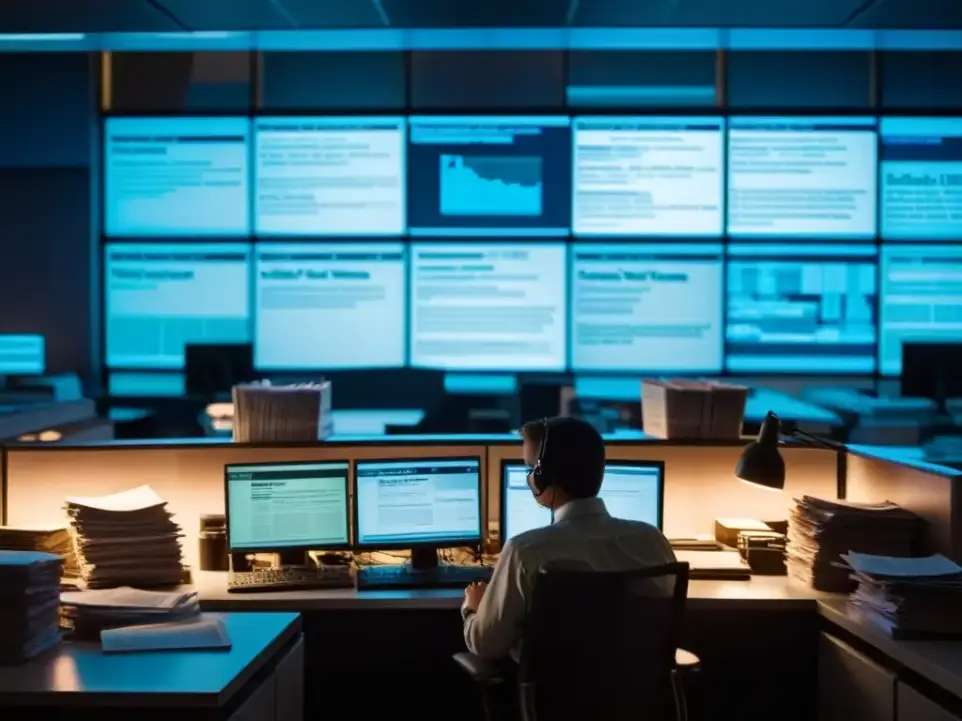Journalism Under Surveillance: The Fight for Source Privacy
In our feature article, "Journalism Under Surveillance: The Fight for Source Privacy," we will thoroughly explore the importance of privacy in journalism and its impact on freedom of expression. Prepare to delve into a comprehensive analysis that will reveal current challenges and strategies for preserving source integrity. Keep exploring and discover more about this fascinating topic!




Introduction
In the exciting world of journalism, source protection and privacy are fundamental aspects that guarantee freedom of expression and access to truthful information. The fight to preserve the confidentiality of sources is a crucial issue that has shaped the history of journalism and remains relevant today. We will now explore the importance of privacy in journalism, the history of the fight to protect sources, and the global impact of surveillance on this noble profession.
Privacy in journalism is a fundamental pillar for the responsible practice of reporting. Ensuring the confidentiality of sources protects informants from potential retaliation, fosters transparency in the flow of information, and promotes a diversity of opinions. Without privacy protection, press freedom would be seriously compromised, limiting access to sensitive data and information that are of public interest.
Journalists need the trust of their sources to obtain truthful and relevant information, and this trust can only be ensured if their sources' privacy rights are respected. The protection of sources and privacy in journalism is essential to maintaining a balanced society and to prevent potential abuses of power that may arise if information is not provided in a secure and confidential manner.
Privacy in journalism is an essential element for the exercise of freedom of expression and the right to information, and its protection is vital for the proper functioning of a democratic society.
The fight for source privacy in journalism has its roots in historical events that have marked important milestones in the protection of press freedom. Over the years, journalists, editors, and activists have defended the confidentiality of sources, facing legal challenges, political pressure, and personal risks.
One of the most emblematic cases is Watergate, where investigative journalism played a crucial role in revealing confidential information that led to the resignation of President Nixon. This episode highlighted the importance of protecting the identity of sources and consolidated the concept of journalistic privilege, which protects source confidentiality in the public interest.
Throughout history, courageous journalists have faced persecution, censorship, and threats to preserve the identity of their sources, making it clear that the fight for privacy in journalism is a constant battle that requires vigilance and constant defense.
Surveillance in journalism, whether by governments, corporations, or private actors, has a significant impact on press freedom and on journalists' ability to protect their sources. The threat of surveillance can deter potential whistleblowers from sharing sensitive information, thus limiting journalism's ability to expose corruption, abuses of power, and other wrongdoing.
Furthermore, surveillance can lead to self-censorship by journalists, who may avoid sensitive investigations for fear of retaliation or negative consequences. This directly affects the quality and veracity of the information that reaches the public, weakening journalism's role as a counterweight to power structures.
In a global context, surveillance in journalism is an issue that requires attention and action from society, institutions, and communication professionals themselves, in order to ensure the protection of sources and the preservation of privacy for the sake of an informed and democratic society.
The right to privacy in journalism
The privacy of sources is a fundamental principle in journalism that protects the identity of those who provide confidential information to the media. This right is essential to guaranteeing freedom of expression and access to information, as it allows journalists to gather sensitive data and reveal facts of public interest without fear of reprisal or exposure of their sources.
The fight for privacy in journalism focuses on preserving the anonymity of informants, ensuring that they are not identified, persecuted, or harassed as a result of their revelations. This aspect is crucial to the practice of journalism, as it fosters transparency, accountability, and the reporting of abuses or corruption, thus contributing to a more informed and participatory society.
The protection of the privacy of sources is a fundamental pillar in the defense of human rights and freedom of expression, and its violation represents a threat to journalistic work and to society as a whole.
At the international level, there are various standards and declarations that support the protection of journalistic sources as a fundamental right. Article 19 of the Universal Declaration of Human Rights establishes the right to freedom of expression and to seek, receive, and impart information and ideas of all kinds, regardless of frontiers, which includes the protection of sources of information.
Furthermore, the Inter-American Court of Human Rights has recognized the importance of safeguarding the identity of journalistic sources as an indispensable requirement for the full exercise of freedom of expression. This jurisprudence has set a significant precedent for the protection of journalists and their sources in the region.
On the other hand, UNESCO has promoted guidelines and recommendations to protect the confidentiality of journalistic sources, recognizing their crucial role in promoting transparency and accountability in democratic societies.
Despite regulatory advances, the protection of the privacy of journalistic sources faces significant challenges in the digital age. Mass surveillance, access to metadata, government pressure, and the prosecution of journalists represent concrete threats to the confidentiality of sources.
Furthermore, the proliferation of social media and the digitalization of information have made protecting the identity of sources more complex, generating new vulnerabilities and obstacles to ensuring their effective protection.
In this context, it is essential to promote and strengthen mechanisms for the protection of journalistic sources, as well as to foster initiatives that raise awareness about the importance of preserving the confidentiality of those who contribute to reporting, in order to consolidate more transparent and democratic societies.
Mass surveillance and the lack of privacy of journalistic sources have had a significant impact on the practice of journalism. Journalists face an environment in which the confidentiality of their sources is threatened, limiting their ability to obtain crucial information and expose uncomfortable truths. This situation not only affects journalistic work but also jeopardizes the public's fundamental right to receive truthful and complete information.
Constant surveillance and the risk of being monitored have led potential sources to feel intimidated and afraid to share sensitive information with journalists. This fear of retaliation or exposure has led to an increase in self-censorship by sources, further limiting journalists' ability to access crucial data and information. As a result, this has negatively impacted journalists' ability to report fully and accurately, which in turn affects the public's ability to be informed about matters of public interest.
The impact of surveillance on the practice of journalism is profound, affecting both media professionals and the general public.

Fight for Privacy in Journalism
In the context of journalism, the fight for the privacy of sources has been a highly relevant issue throughout history. The roots of this fight date back to situations in which journalists and their sources have faced threats, persecution, and retaliation for revealing sensitive or uncomfortable information to certain sectors of power. This scenario has led to the need to establish legislation and legal precedents that protect the identity of journalistic sources and safeguard the confidentiality of the information they share with the media. The importance of this fight lies in the defense of freedom of expression and the right to information, fundamental pillars of a democratic society. Without protecting the privacy of sources, many facts of public interest could remain obscure, limiting journalists' ability to fulfill their role of informing citizens and maintaining scrutiny over the actions of governments, businesses, and other institutions. The evolution of technology and increasing state and corporate surveillance have posed new challenges in this fight, creating the need to address both ethical and practical issues to ensure the protection of journalistic sources in an increasingly complex and monitored environment.
Journalists working to defend source privacy face significant challenges in their daily work. Many have experienced pressure to reveal the identities of their sources, which jeopardizes the confidentiality of the information obtained and the safety of those providing sensitive information. Some journalists have been subjected to intimidation, harassment, and even legal prosecution for refusing to reveal their sources. These experiences highlight the importance of protecting the identity of those who rely on journalists to report relevant and often crucial information.
The fight for source privacy is an arduous task that demands courage and commitment from journalists. Many have had to resort to creative strategies and the use of encryption tools to safeguard the identity of their sources and the confidentiality of information. These experiences reveal the constant tension between the duty to inform and the need to protect those providing sensitive information. Journalists defending the privacy of sources face difficult decisions and significant risks, but their work is essential to maintaining independent journalism committed to the truth.
Defending the privacy of sources is not only a challenge for journalists but also has important implications for society as a whole. Journalists' ability to protect their sources and maintain the confidentiality of information is essential for the effective exercise of freedom of expression and the right to information. Journalists' experiences in this struggle highlight the need to protect and strengthen mechanisms that guarantee the confidentiality of sources in order to preserve free, critical, and responsible journalism.
Global Impact of Surveillance on Journalism
In different parts of the world, numerous cases of surveillance of journalists have been documented, causing great concern in the international community. For example, in countries such as China, Russia, and Turkey, situations have been reported in which journalists have been subjected to illegal surveillance, threats, and even arrests by government authorities. These cases have highlighted the vulnerability of media professionals in repressive environments and the negative impact that surveillance can have on their work.
In the digital realm, there have also been cases of cyberspying on journalists, aimed at obtaining confidential information or restricting their ability to investigate and publish. These international case studies have highlighted the importance of protecting the privacy of journalistic sources and implementing effective measures to counter illegal surveillance.
The compilation and analysis of these cases provides a comprehensive view of the magnitude of the problem and its implications for press freedom worldwide.
Surveillance of journalists poses a direct threat to freedom of expression and access to accurate and timely information. When media professionals are subjected to surveillance, whether physical or digital, it creates a climate of fear that can lead to self-censorship and reduced coverage of sensitive issues. This limits journalists' ability to report independently and objectively, thus undermining the public's fundamental right to be informed.
Furthermore, indiscriminate surveillance of journalistic sources puts their confidentiality at risk, which can discourage future whistleblowers from disclosing relevant information for fear of retaliation. This negatively affects transparency and accountability in society, hindering the crucial role the media plays in reporting abuses and exposing corruption.
The consequences of surveillance for freedom of expression and access to information are significant and require a strong response from the international community.
Surveillance of journalists not only has local implications but also affects journalistic work worldwide. The impact of surveillance on media autonomy and the integrity of news professionals transcends national borders, generating a chilling effect that extends globally.
This landscape of pervasive surveillance can discourage coverage of sensitive issues and in-depth investigation, which in turn limits journalists' ability to report on topics that require rigorous scrutiny. The loss of trust in the confidentiality of sources and the constant threat of surveillance undermine the credibility and independence of the press worldwide.
Therefore, the impact of surveillance on journalistic work worldwide is a cause for concern that demands concrete actions to safeguard the privacy of sources and protect freedom of expression in all contexts.
Journalism Privacy Defenders
Journalism committed to truth and transparency faces constant challenges, especially regarding the protection of sources. Organizations and activists defending source privacy play a crucial role in protecting whistleblowers and preserving independent journalism.
These organizations, such as the Foundation for Press Freedom (FLIP), Reporters Without Borders, and the Committee to Protect Journalists (CPJ), are dedicated to providing legal support, advice, and resources to journalists and media outlets facing threats to the privacy of their sources. Their work includes advocacy in court cases, promoting laws that protect whistleblowers, and raising awareness about the importance of confidentiality in journalism.
These journalistic privacy defenders also network with human rights organizations and specialized lawyers to offer comprehensive support to media professionals fighting to preserve the confidentiality of their sources.
Actions and Campaigns for the Protection of Privacy in Journalism
The fight for privacy in journalism is manifested through various actions and campaigns aimed at raising awareness about the importance of protecting sources of information. These initiatives include promoting legislation that protects the identity of informants, denouncing practices that violate the confidentiality of sources, and social mobilization to demand respect for privacy in the practice of journalism. In addition, awareness-raising campaigns are carried out for both media professionals and the general public, highlighting the fundamental role that anonymous sources play in revealing information of public interest. These actions seek to generate greater social and political support for the protection of privacy in journalism, contributing to the creation of an environment conducive to the exercise of press freedom and access to information. Collaboration between journalists and human rights defenders is essential to ensure that dissenting voices, whistleblowers, and those who risk their safety by providing relevant information find the support they need to carry out their work safely and securely.

Conclusions
In the current context, the fight for the privacy of journalistic sources faces significant challenges that require careful attention. One of the most urgent challenges is protecting the identity of sources in a digital environment, where mass surveillance and the interception of communications pose a constant threat. To address this challenge, it is crucial that journalists use encryption tools and adopt digital security practices to protect the confidentiality of their sources.
Another major challenge is the growing legal and political pressure to reveal sources of information. In many countries, laws requiring journalists to reveal their sources undermine the press's ability to serve as an effective counterweight to power and expose whistleblowers to retaliation. In this regard, it is essential that laws protecting the confidentiality of journalistic sources be enacted and strengthened as a fundamental pillar of freedom of expression and the right to information.
Furthermore, training and awareness-raising on the importance of the privacy of journalistic sources are key aspects to addressing future challenges. Journalists, media outlets, and human rights organizations must work together to promote a culture of respect for and protection of the confidentiality of sources, recognizing their crucial role in reporting abuses, ensuring accountability, and defending human rights.
Protecting the privacy of journalistic sources will remain a crucial challenge in a constantly evolving digital environment. The expansion of state surveillance and legal pressure to reveal sources pose significant threats to journalists' ability to carry out their work independently and responsibly. It is essential to develop and strengthen legal frameworks that safeguard the confidentiality of sources, and to promote technologies and practices that protect the identity of those who provide sensitive information.
Furthermore, awareness and training in digital security and the protection of journalistic sources are aspects that must not be overlooked. Journalists and media outlets must be equipped with the knowledge and tools necessary to safeguard the privacy of their sources in a context of increasing vulnerability.
Ultimately, defending the privacy of journalistic sources is essential to preserving the integrity of journalism and ensuring access to truthful and relevant information, contributing to the protection of human rights and holding those in positions of power accountable.
Privacy in journalism plays a fundamental role in the protection and promotion of human rights. The ability of journalists to communicate confidentially with sources who may expose abuses, corruption, or human rights violations is essential to the oversight and reporting function that journalism plays in a democratic society.
Guaranteeing the privacy of journalistic sources directly contributes to the protection of fundamental rights, such as freedom of expression, access to information, and the right to privacy. Without an environment that safeguards the confidentiality of sources, the press's ability to fulfill its role of monitoring power, challenging authority, and serving as a channel for the expression of diverse ideas and opinions would be undermined.
In this sense, the defense of privacy in journalism is not only a matter of professional ethics, but also a fundamental pillar for safeguarding human rights and preserving an informed, critical, and participatory society.

 IHRO NEWS
IHRO NEWS